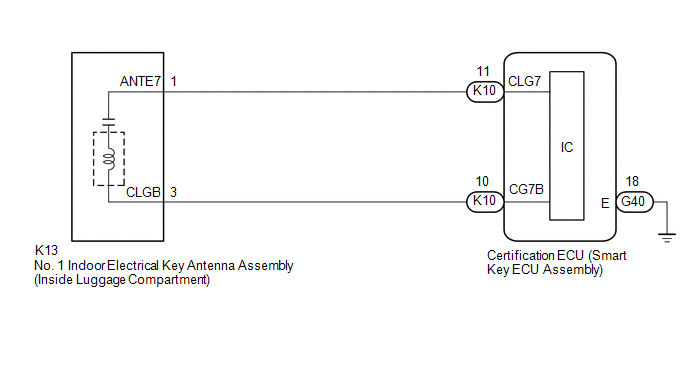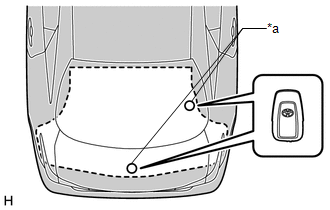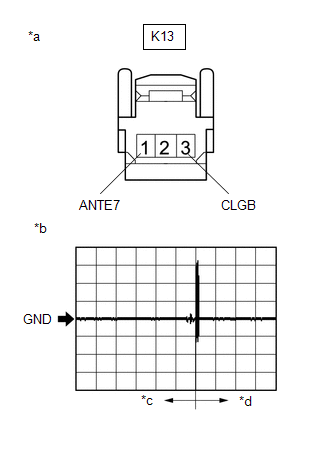- Door is closed
- Power switch off
- Electrical key transmitter sub-assembly not inside vehicle
- Driver door lock sensor touched
| Last Modified: 09-10-2025 | 6.11:8.1.0 | Doc ID: RM100000001BHXU |
| Model Year Start: 2019 | Model: Avalon HV | Prod Date Range: [04/2018 - ] |
| Title: THEFT DETERRENT / KEYLESS ENTRY: SMART KEY SYSTEM (for Entry Function, HV Model): Key Luggage Compartment Lock-in Prevention Function does not Operate; 2019 - 2022 MY Avalon HV [04/2018 - ] | ||
|
Key Luggage Compartment Lock-in Prevention Function does not Operate |
DESCRIPTION
If the entry luggage compartment lock-in prevention function does not operate, there may be a problem with the communication between the No. 1 indoor electrical key antenna assembly (inside luggage compartment) and electrical key transmitter sub-assembly, wave interference or a malfunction in the certification ECU (smart key ECU assembly).
WIRING DIAGRAM

CAUTION / NOTICE / HINT
NOTICE:
- The smart key system (for Entry Function, HV Model) uses the CAN communication system. Inspect the communication function by following How to Proceed with Troubleshooting. Troubleshoot the smart key system (for Entry Function, HV Model) after confirming that the communication systems are functioning properly.
- When using the Techstream with the power switch off, connect the Techstream to the DLC3 and turn a courtesy light switch on and off at intervals of 1.5 seconds or less until communication between the Techstream and the vehicle begins. Then select the vehicle type under manual mode and enter the following menus: Body Electrical / Smart Key. While using the Techstream, periodically turn a courtesy light switch on and off at intervals of 1.5 seconds or less to maintain communication between the Techstream and the vehicle.
- Check that there are no electrical key transmitter sub-assemblies in the vehicle.
- Before replacing the certification ECU (smart key ECU assembly), refer to smart key system (for Entry Function, HV Model) Precaution.
- After repair, confirm that no DTCs are output by performing "DTC Output Confirmation Operation".
PROCEDURE
PROCEDURE
|
1. |
CHECK ENTRY LUGGAGE COMPARTMENT OPEN OPERATION |
(a) Connect all connectors and check that the entry luggage compartment open function operates.
|
Result |
Proceed to |
|---|---|
|
Luggage open function operates normally |
A |
|
Luggage open function does not operate normally |
B |
| B |

|
|
|
2. |
CHECK WAVE ENVIRONMENT |
|
(a) Bring the electrical key transmitter sub-assembly near the No. 1 indoor electrical key antenna assembly (inside luggage compartment), and check that the entry luggage compartment lock-in prevention function operates. NOTICE: In order to prevent the electrical key transmitter sub-assembly from being locked inside the vehicle, perform this inspection with the window of a door open. HINT:
|
|
|
Result |
Proceed to |
|---|---|
|
Entry functions does not operate normally |
A |
|
Entry functions operate normally |
B |
| B |

|
AFFECTED BY WAVE INTERFERENCE |
|
|
3. |
CHECK KEY DIAGNOSTIC MODE |
(a) Check the following antenna in key diagnostic mode.
Body Electrical > Smart Key > Utility
|
Tester Display |
|---|
|
Communication Check(Key Diag Mode) |
|
(b) Select either channel 1 or channel 2 and inspect key diagnostic mode for each channel. (1) Check the No. 1 indoor electrical key antenna assembly (inside luggage compartment): When the electrical key transmitter sub-assembly is at either inspection point, check that the wireless buzzer sounds. HINT:
|
|
|
Result |
Proceed to |
|---|---|
|
Wireless buzzer does not sound |
A |
|
Wireless buzzer sounds |
B |
| B |

|
REPLACE CERTIFICATION ECU (SMART KEY ECU ASSEMBLY) |
|
|
4. |
CHECK HARNESS AND CONNECTOR (CERTIFICATION ECU (SMART KEY ECU ASSEMBLY) - NO. 1 INDOOR ELECTRICAL KEY ANTENNA ASSEMBLY (INSIDE LUGGAGE COMPARTMENT)) |
(a) Disconnect the K10 certification ECU (smart key ECU assembly) connector.
(b) Disconnect the K13 No. 1 indoor electrical key antenna assembly (inside luggage compartment) connector.
(c) Measure the resistance according to the value(s) in the table below.
Standard Resistance:
|
Tester Connection |
Condition |
Specified Condition |
|---|---|---|
|
K10-11 (CLG7) - K13-1 (ANTE7) |
Always |
Below 1 Ω |
|
K10-10 (CG7B) - K13-3 (CLGB) |
Always |
Below 1 Ω |
|
K10-11 (CLG7) or K13-1 (ANTE7) - Other terminals and body ground |
Always |
10 kΩ or higher |
|
K10-10 (CG7B) or K13-3 (CLGB) - Other terminals and body ground |
Always |
10 kΩ or higher |
(d) Reconnect the K10 certification ECU (smart key ECU assembly) connector.
| NG |

|
REPAIR OR REPLACE HARNESS OR CONNECTOR |
|
|
5. |
CHECK CERTIFICATION ECU (SMART KEY ECU ASSEMBLY) (OUTPUT TO NO. 1 INDOOR ELECTRICAL KEY ANTENNA ASSEMBLY (INSIDE LUGGAGE COMPARTMENT)) |
|
(a) Using an oscilloscope, check the wave form. OK:
|
|
| NG |

|
REPLACE CERTIFICATION ECU (SMART KEY ECU ASSEMBLY) |
|
|
6. |
REPLACE NO. 1 INDOOR ELECTRICAL KEY ANTENNA ASSEMBLY (INSIDE LUGGAGE COMPARTMENT) |
(a) Replace the No. 1 indoor electrical key antenna assembly (inside luggage compartment).
|
|
7. |
CHECK KEY LOCK-IN PREVENTION FUNCTION |
(a) Check that the entry luggage compartment lock-in prevention function operates normally.
OK:
Entry luggage compartment lock-in prevention function operates normally.
| OK |

|
END (NO. 1 INDOOR ELECTRICAL KEY ANTENNA ASSEMBLY (INSIDE LUGGAGE COMPARTMENT) WAS DEFECTIVE) |
| NG |

|
REPLACE CERTIFICATION ECU (SMART KEY ECU ASSEMBLY) |
|
|
|
![2019 - 2022 MY Avalon HV [04/2018 - ]; THEFT DETERRENT / KEYLESS ENTRY: SMART KEY SYSTEM (for Entry Function, HV Model): HOW TO PROCEED WITH TROUBLESHOOTING](/t3Portal/stylegraphics/info.gif)


